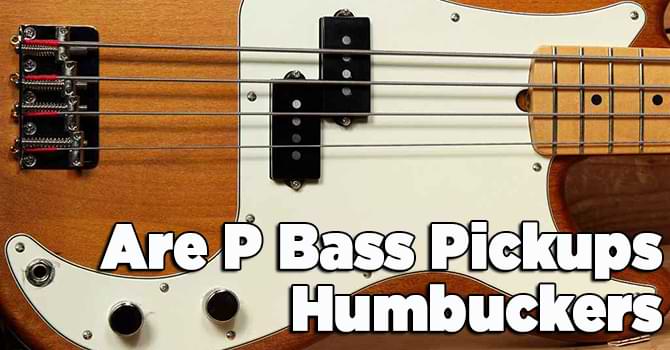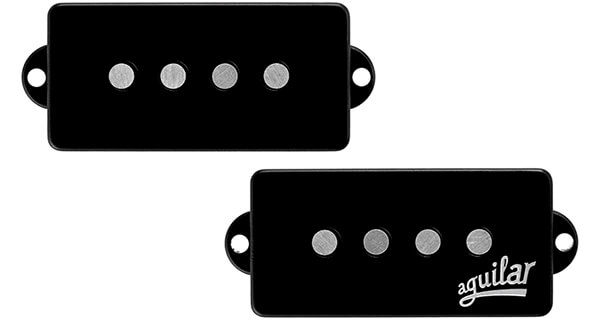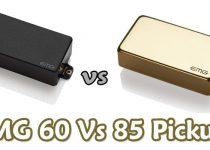Are P Bass Pickups Humbuckers? [Difference]
P Bass pickups and humbuckers are two popular choices for electric bass guitars, each with its own unique characteristics and advantages. Bass players frequently engage in debates about the distinctions between these two pickup types and whether P Bass pickups can be classified as humbuckers. Now, let’s dive into the details of P Bass pickups, humbucker pickups, and whether P Bass pickups can truly be considered humbuckers.

# Table of Contents =>
- 1 1. Understanding Bass Guitar Pickups –
- 2 2. P Bass Pickups Demystified –
- 3 3. Humbucker Pickups Explained –
- 4 4. The P Bass Pickup Design –
- 5 5. Similarities and Differences –
- 6 6. Can P Bass Pickups Be Considered Humbuckers?
- 7 7. Modifying P Bass Pickups –
- 8 8. Famous Bassists’ Choices –
- 9 Musical Styles and Pickup Preferences –
1. Understanding Bass Guitar Pickups –
Pickups play a pivotal role in the anatomy of an electric bass guitar. They are integral in transforming the string vibrations into an electrical signal that can be amplified and audibly rendered through speakers or headphones. In the realm of bass guitars, two principal types of pickups are prevalent: single-coil and humbucker pickups.
a) Single-Coil vs Humbucker Pickups:

Single-coil pickups are celebrated for their crisp, transparent, and expressive tonal qualities. They comprise a solitary coil of wire wound around magnets, thus generating a magnetic field. Nevertheless, single-coil pickups are vulnerable to electromagnetic interference, leading to the familiar hum or noise.
Conversely, humbucker pickups, as the moniker implies, actively counteract and eliminate hum and noise. They accomplish this feat by employing two coils of wire, wound in opposing directions and linked in series. This dual-coil configuration effectively eradicates unwanted noise while preserving the fundamental character of the instrument’s tone.
b) How Bass Pickups Produce Sound:
When you pluck a string on your bass guitar, it vibrates and disturbs the magnetic field created by the pickup’s magnets. This disturbance induces an electrical current in the pickup’s coils, generating an audio signal. The signal is then sent to your bass amp or recording equipment, where it is amplified and transformed into sound.
Now that we have a basic understanding of pickups, let’s explore the P Bass pickup and its characteristics.
2. P Bass Pickups Demystified –
a) Introduction to P Bass Pickups:

The P Bass pickup, which stands for Precision Bass pickup, emerged as a single-coil innovation conceived by Leo Fender during the early 1950s. Its initial introduction was on the Fender Precision Bass, an instrument that not only revolutionized the world of bass guitars but also etched an enduring mark in musical history. Over the passage of time, the P Bass pickup has evolved into an iconic choice favored by bassists worldwide, celebrated for its unmistakable tonal characteristics and exceptional adaptability.
b) The History of Precision Bass Pickups:
Leo Fender’s goal was to create a bass guitar that was more reliable, easier to play, and produced a consistent, well-defined tone. The P Bass pickup was a key element in achieving this vision. Its single-coil design provided a clear and focused sound, making it easier for bassists to hold down the low end in a band setting.
c) Characteristics of P Bass Pickups:
P Bass pickups are known for their rich, deep, and punchy tone. They have a pronounced midrange presence that helps the bass cut through the mix. The single-coil design imparts a unique clarity and articulation to each note, making it an excellent choice for styles like rock, funk, and blues.
d) Popular Bass Models Using P Bass Pickups:
While the Fender Precision Bass was the first to feature P Bass pickups, many other bass manufacturers have adopted this design over the years. Some well-known bass models that use P Bass pickups include the G&L L-2000, Music Man StingRay, and various Squier and Fender models.
Now, let’s explore humbucker pickups in detail before comparing the two pickup types.
3. Humbucker Pickups Explained –
What Are Humbucker Pickups?

Humbucker pickups, commonly known as “humbuckers,” were engineered specifically to tackle the noise problems associated with single-coil pickups. These pickups encompass two coils of wire that are intricately wound in opposing directions and linked in a series circuit. This dual-coil arrangement creates the humbucking effect, effectively neutralizing undesirable electrical interference and hum, thereby yielding a signal of reduced noise and increased tranquility.
The Humbucking Effect: Noise Reduction:
The primary advantage of humbucker pickups is their ability to reduce the 60-cycle hum and electromagnetic interference that plagues single-coil pickups. This noise reduction makes humbuckers an excellent choice for high-gain and high-volume playing environments, where single-coil pickups may become noisy.
Humbucker Wiring and Design Variations:
Humbuckers come in various designs and configurations, each with its own tonal characteristics. For example, some humbuckers have ceramic magnets, while others use Alnico magnets, influencing the pickup’s output and tonal qualities. Additionally, coil tapping and coil splitting are wiring options that allow humbuckers to mimic the sound of single-coil pickups when desired.
Well-Known Bass Models Featuring Humbuckers:
Although humbuckers are frequently linked with electric guitars, they are equally prevalent on numerous bass guitars. Bass models such as the Gibson Thunderbird and Epiphone Thunderbird, in addition to certain bespoke bass constructions, incorporate humbucker pickups. The decision to employ humbuckers in a bass guitar frequently stems from the musician’s inclination for a specific tonal quality or the requirement for noise mitigation.
With a comprehensive grasp of both P Bass and humbucker pickups now established, let’s proceed to explore the intricate details of the design of P Bass pickups.
4. The P Bass Pickup Design –
a) Coil Configuration in P Bass Pickups:
P Bass pickups are single-coil pickups, meaning they consist of a single coil of wire wound around magnets. This single-coil design captures the vibrations of the bass strings and converts them into an electrical signal. The simplicity of the P Bass pickup’s design contributes to its signature tone and clarity.
b) Magnetic Structure:
The magnets used in P Bass pickups are typically Alnico magnets, known for their warm and balanced magnetic field. Alnico magnets help create the classic P Bass sound, characterized by a strong midrange presence and a rich low end. The magnetic field generated by the magnets interacts with the vibrating strings to produce the pickup’s unique tonal qualities.
How P Bass Pickups Capture Sound?
As you strike a note on your bass guitar, the corresponding string initiates vibrations directly above the P Bass pickup. These vibrations, in turn, disrupt the magnetic field formed by the pickup’s magnets, inducing an electrical current within the coil of the pickup. Subsequently, this electrical current is directed to your amplifier or recording equipment, where it undergoes amplification and metamorphoses into audible sound.
Now that we have explored the design and characteristics of both P Bass and humbucker pickups, let’s compare these two pickup types and examine whether P Bass pickups can be classified as humbuckers.
5. Similarities and Differences –
a) Tone Characteristics of P Bass Pickups:

P Bass pickups are known for their distinctive tone. They produce a clear, focused, and punchy sound with a strong midrange presence. The midrange emphasis helps the bass guitar cut through the mix, making it a favorite choice for genres like rock, funk, and R&B. P Bass pickups offer a balanced blend of warmth and articulation.
i) Humbucker vs. P Bass: Output and Signal Strength:
Humbucker pickups typically have a higher output compared to P Bass pickups. This increased output results in a thicker and more powerful signal when playing through an amplifier. Higher output can be advantageous for achieving saturated overdrive or distortion tones, making humbuckers a popular choice for heavy rock and metal genres.
ii) Noise Reduction: The Hum-Canceling Effect:
One of the key differences between humbuckers and P Bass pickups is their noise-cancelling capabilities. Humbuckers excel at reducing hum and interference due to their dual-coil design, which cancels out electromagnetic noise. In contrast, P Bass pickups, being single-coil pickups, are more susceptible to interference, especially in environments with high electrical noise.
b) Comparing the Sound of P Bass Pickups and Humbuckers:
While both P Bass pickups and humbuckers possess their distinctive tonal attributes, they aptly serve divergent musical requirements. P Bass pickups excel in providing clarity and articulation, rendering them a prime choice for genres that demand precision and punch. Conversely, humbuckers produce a denser and more robust sonic profile, positioning them as the favored selection for musicians seeking a mellower, overdriven tone.
Now, let’s address the question at the heart of this guide: Can P Bass pickups be considered humbuckers?
6. Can P Bass Pickups Be Considered Humbuckers?
a) Definition of Humbuckers:
To determine whether P Bass pickups can be classified as humbuckers. We need to understand the defining characteristics of humbucker pickups. As mentioned earlier, humbuckers feature two coils of wire wound in opposite directions and connected in series. This dual-coil design is the essence of what makes a pickup a humbucker.
b) Understanding Humbucker Principles:
The primary function of the two coils in a humbucker pickup is to cancel out electromagnetic interference and noise. When noise or hum is induced in one coil, it is cancelled out by the other coil’s opposing signal. This results in a quieter and cleaner output signal compared to single-coil pickups.
c) The P Bass Pickup’s Humbucking Qualities:
While P Bass pickups are technically single-coil pickups, they do exhibit some humbucking qualities. The reason behind this lies in their design. P Bass pickups are constructed with two sets of pole pieces (magnets), one for each string pair (E and A strings, and D and G strings).
These dual sets of pole pieces, while not full coils like in humbuckers, have a similar effect in canceling out hum and noise. The magnetic fields generated by the pole pieces interact with each other and with the strings, contributing to the reduction of interference and hum.
d) Arguments for classifying P Bass pickups as humbuckers:
Humbucking Effect: P Bass pickups do exhibit some degree of noise reduction due to their dual-pole-piece design, which resembles the dual-coil structure of humbuckers.
Reduced Hum: Players often find that P Bass pickups produce less noise compared to typical single-coil pickups, making them a quieter option.
Tonal Balance: P Bass pickups offer a balanced tonal profile with a strong midrange presence, similar to humbuckers.
e) Arguments against classifying P Bass pickups as humbuckers:
Technical Differences: P Bass pickups lack the dual-coil configuration that is the defining characteristic of humbuckers.
Not True Humbuckers: While P Bass pickups reduce noise to some extent, they do not provide the same level of noise cancellation as true humbuckers.
Tonal Distinction: P Bass pickups have a distinct tonal character that sets them apart from humbuckers, with a brighter and more focused sound.
Ultimately, whether you consider P Bass pickups to be humbuckers depends on your perspective and the specific criteria you use to define humbuckers. While P Bass pickups share some characteristics with humbuckers, they are not true humbuckers in the technical sense. Now, let’s explore how you can modify P Bass pickups to achieve a humbucker-like effect.
Check out: Best Boutique Strat Pickups for Rock
7. Modifying P Bass Pickups –
a) Modifying P Bass Pickups for Humbucking Effect:
If you’re a bassist who loves the sound of P Bass pickups but also desires the noise-reducing benefits of humbuckers, there are modification options available. One common modification is to add a dummy coil or a second coil to the P Bass pickup, effectively creating a humbucker-style pickup.
b) Coil Splitting and Series/Parallel Wiring:
Another modification technique is coil splitting or series/parallel wiring. Coil splitting allows you to switch between using one coil or both coils of a P Bass pickup. When both coils are engaged, the pickup mimics a humbucker’s operation, effectively diminishing noise and delivering a fuller, more substantial sound. Series/parallel wiring grants you the option to select either a series connection, which cancels hum, or a parallel connection, akin to a single-coil configuration.
These modifications can give you the best of both worlds by retaining the classic P Bass tone while providing humbucking capabilities when needed.
c) Achieving Humbucker-Like Tones with P Bass Pickups:
If your goal is to achieve humbucker-like tones without modifying your P Bass pickups. You can explore various techniques with your amplifier and effects pedals. Using overdrive or distortion pedals can help you thicken your tone and introduce some of the characteristics associated with humbuckers. Experimenting with EQ settings can also allow you to shape your sound to resemble a humbucker’s warmth and thickness.
Now, let’s take a look at some famous bassists’ preferences when it comes to choosing between P Bass pickups and humbuckers.
8. Famous Bassists’ Choices –
a) Iconic Bassists Who Prefer P Bass Pickups:
James Jamerson:
The legendary Motown bassist was known for his use of a Fender Precision Bass with P Bass pickups. His iconic basslines on countless Motown hits showcased the clarity and punch of the P Bass sound.
Geezer Butler:
The Black Sabbath bassist often used a Fender Jazz Bass with P Bass pickups during his career. His heavy and distinctive tone contributed to the band’s iconic sound.
Sting:
The frontman of The Police favored the Fender Precision Bass, appreciating its punchy and focused sound. Especially in the context of the band’s reggae and rock-infused music.
b) Renowned Bassists Who Opt for Humbuckers:
Geddy Lee:
The Rush bassist is known for using Rickenbacker basses equipped with humbuckers. His powerful and progressive rock sound is characterized by the warmth and sustain of humbucking pickups.
Billy Sheehan:
The virtuoso bassist has been associated with Yamaha basses featuring dual humbucker pickups. His lightning-fast playing and intricate technique benefit from the clarity and output of humbuckers.
Les Claypool:
The Primus frontman and bassist has experimented with various basses, including those with humbuckers. The versatility of humbuckers complements his eclectic and unconventional playing style.
Musical Styles and Pickup Preferences –
It’s important to note that a bassist’s choice of pickups often aligns with their musical style and sonic preferences. P Bass pickups are favored for their clarity and articulation, making them suitable for genres like funk, rock, and blues. In contrast, humbuckers offer a thicker and more powerful sound. Which is making them a preferred choice for heavier rock, metal, and progressive genres.
In conclusion, the decision between P Bass pickups and humbuckers ultimately comes down to your personal playing style, musical genre, and tonal preferences. Both pickup types have their unique characteristics and advantages, and many players find themselves using both at different times to suit their musical needs.
Last Updated on October 13, 2023 by Perry Garner


